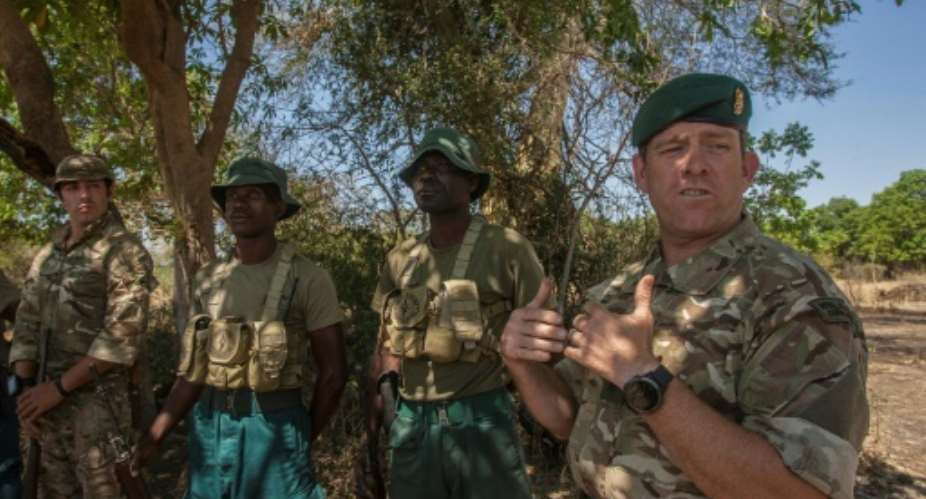Under a scorching sun, a team of British soldiers and Malawian rangers sheltered under a tree ready to pounce on their prey: poachers.
The combined force, armed with rifles and handcuffs, did not encounter any poachers as it patrolled the 530 square kilometre (240 square mile) Liwonde national park in Malawi's south.
But the presence of the highly-trained and well-equipped British forces was reassuring for the rangers who routinely confront gangs of poachers armed with Kalashnikovs.
Liwonde, which borders Mozambique, is Malawi's leading game reserve and is home to the southern African country's largest elephant and rhino populations.
The seven British soldiers are there to train 35 of Malawi's anti-poaching rangers.
Prince Harry is the public face of the project that began in 2016 and earlier this year he visited the park to oversee the relocation of over 300 elephants to the Nkhotakota game park in central Malawi.
'A poaching crisis'
"We were in a poaching crisis in 2015 in this park... but the situation has now been contained," said Bright Kumchedwa, the director of Malawi's parks and wildlife department.
 Poaching in Malawi halved the country's elephant population from 4,000 in the 1980s to 2,000 in 2015
Poaching in Malawi halved the country's elephant population from 4,000 in the 1980s to 2,000 in 2015
And although the fight against the illicit wildlife trade is far from over -- poaching halved the country's elephant population from 4,000 in the 1980s to 2,000 in 2015 -- gains are being made.
"The good news is that we have had only one case of a rhino being poached in two years in this park," Kumchedwa told AFP.
"(British forces) are transferring military skills to Malawian rangers to use in conservation... the soldiers are adding value to the training of rangers."
Michael Geldard, the British army colonel in charge of the training, described the campaign against poachers as "a game of cat and mouse with danger".
"We are here to train rangers how to protect themselves from wild animals and not necessarily to shoot poachers," said Geldard, who is also Britain's defence attache to several African countries.
"We are training them how to track down poachers and defend themselves from animals."
Kingsley Kachoka, a Malawian who is a sergeant in the British army, told AFP he was delighted to be home "to help my country to deal with poachers".
"I hope there will be a change because we are covering more ground in counter-poaching skills."
'Winning the war'
Malawian ranger Edward Makupiza said that in the past he feared being shot by heavily armed Mozambican poachers who carry assault rifles when they cross the border in to Malawi in pursuit of elephants.
"But now after training with the British army, I know how to protect myself and others from danger."
Craig Reid runs African Parks, a conservation organisation that manages several game parks under a deal with Lilongwe, and said his team had pioneered the use of cyber-trackers and drones to tackle poaching.
 Patrols at Liwonde national park have led to the arrest of 130 poachers, most of whom have been sentenced to jail terms of at least six years
Patrols at Liwonde national park have led to the arrest of 130 poachers, most of whom have been sentenced to jail terms of at least six years
"The landscape has changed and we have become much more professional in dealing with poaching," he said.
The park also owns a helicopter used to help track poachers.
"It's an expensive asset -- but it pays to use it," Reid said.
"Poaching is declining dramatically," he said, with officers having seized 27,000 wire snares, 43 kilograms of ivory and 56 rounds of illegal ammunition from poachers between from August 2015 and October 2017 according to African Parks.
Patrols at the park have led to the arrest of 130 poachers, most of whom have been sentenced to jail terms of at least six years following a move by the government to stiffen penalties. The maximum sentence is now 30 years.
"We are winning the war against poaching," Kumchedwa said.





 We’re disappointed over gov’t’s lacklustre attitude to negotiations of our condi...
We’re disappointed over gov’t’s lacklustre attitude to negotiations of our condi...
 No more Buffer Stock as Mahama promises to decentralise SHS food supply
No more Buffer Stock as Mahama promises to decentralise SHS food supply
 NSS urges President Akufo-Addo to sign National Service Bill into law
NSS urges President Akufo-Addo to sign National Service Bill into law
 You're lying, your 7-11pm dumsor attributed to overloaded transformers is false ...
You're lying, your 7-11pm dumsor attributed to overloaded transformers is false ...
 Consult Council of State on anti-gay bill – Mahama advises Akufo-Addo
Consult Council of State on anti-gay bill – Mahama advises Akufo-Addo
 Transport Ministry has no power to determine fares – COPEC
Transport Ministry has no power to determine fares – COPEC
 Brace yourselves for more economic hardship – Prof Adei to Ghanaians
Brace yourselves for more economic hardship – Prof Adei to Ghanaians
 Any government depending on IMF is likely to fail – Grand Coalition
Any government depending on IMF is likely to fail – Grand Coalition
 Ghana risks losing premium cocoa position due to galamsey – COCOBOD laments
Ghana risks losing premium cocoa position due to galamsey – COCOBOD laments
 Akufo-Addo launches NSS policy document to tackle under-utilisation of service p...
Akufo-Addo launches NSS policy document to tackle under-utilisation of service p...
